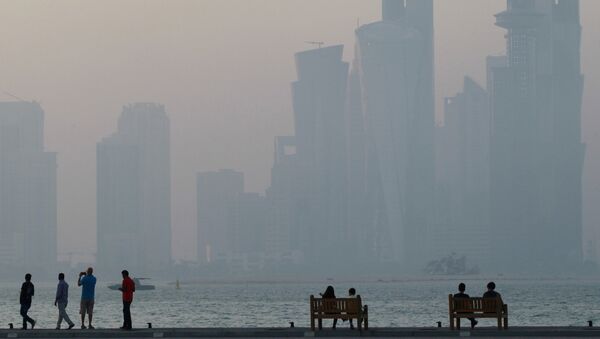According to the Kuwait News Agency (KUNA), the move followed after Kuwaiti Emir Sheikh Sabah al-Ahmad al-Jaber al-Sabah received Qatari Foreign Minister Mohammed bin Abdulrahman Al Thani who handed the letter from Doha with its response to the list of demands under the ultimatum.
In June, the four Arab countries handed an ultimatum to Qatar, which contains demands Doha must meet to settle the dispute.
In response, Doha described the demands as "unrealistic" and urged for them to be revised after being given 10 days to comply. According to the Qatari foreign minister, sanctions imposed are "illegal" and an attempt at tampering with the nation’s sovereignty. The initial deadline expired on Sunday.
Radio Sputnik reached to Peter Sluglett, visiting research professor at the Middle East Institute at the National University of Singapore, to discuss the Guld diplomatic row and its possible further development.
Sluglett pointed out that those demands are "unreasonable" and expecting a state to do what an external force insists upon is "absurd."
"Most of these things are absolutely unreasonable and unwarranted. It is harassing national sovereignty. It doesn’t seem to me that there is any chance of any of them being accepted," he said.
The expert also suggested that many significant foreign powers are unlikely to support those demands.
Furthermore, Sluglett noted that so far the impact of sanctions in Qatar’s normal life has not been significant.
"They have imports of food coming from Turkey and Iran. Qatar has very solid income coming in from the sale of gas," he said.
Commenting on the possible future developments of the situation, Sluglett suggested the problem could be taken to the UN or the situation may result in "the end of the Gulf Cooperation Council." However, Riyadh is unlikely to receive long-term support for its initiative from external players.
According to Sluglett, the current Gulf crisis is the result of Saudi Arabia’s single-handed policy which is, for example, responsible for the ongoing conflict in Yemen.
"I don’t think anybody would support making these demands for a sovereign nation. It wouldn’t be able to accept them. This would make Qatar sort of a vassal of Saudi Arabia," Sluglett concluded.
On June 5, a number of countries, including Saudi Arabia, the UAE, Bahrain and Egypt, cut diplomatic ties with Qatar and embargoed all sea, air and land traffic to the country, accusing Doha of supporting terrorist groups, particularly the Muslim Brotherhood terrorist movement, as well as of interfering in other countries' domestic affairs. Several other states in the region have reduced diplomatic relations with the country.
The Qatari Foreign Ministry rejected the accusations of Doha's interference in other countries' domestic affairs.





